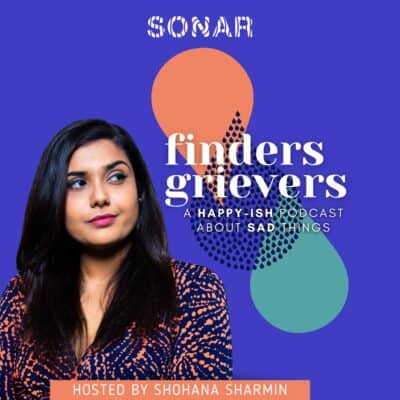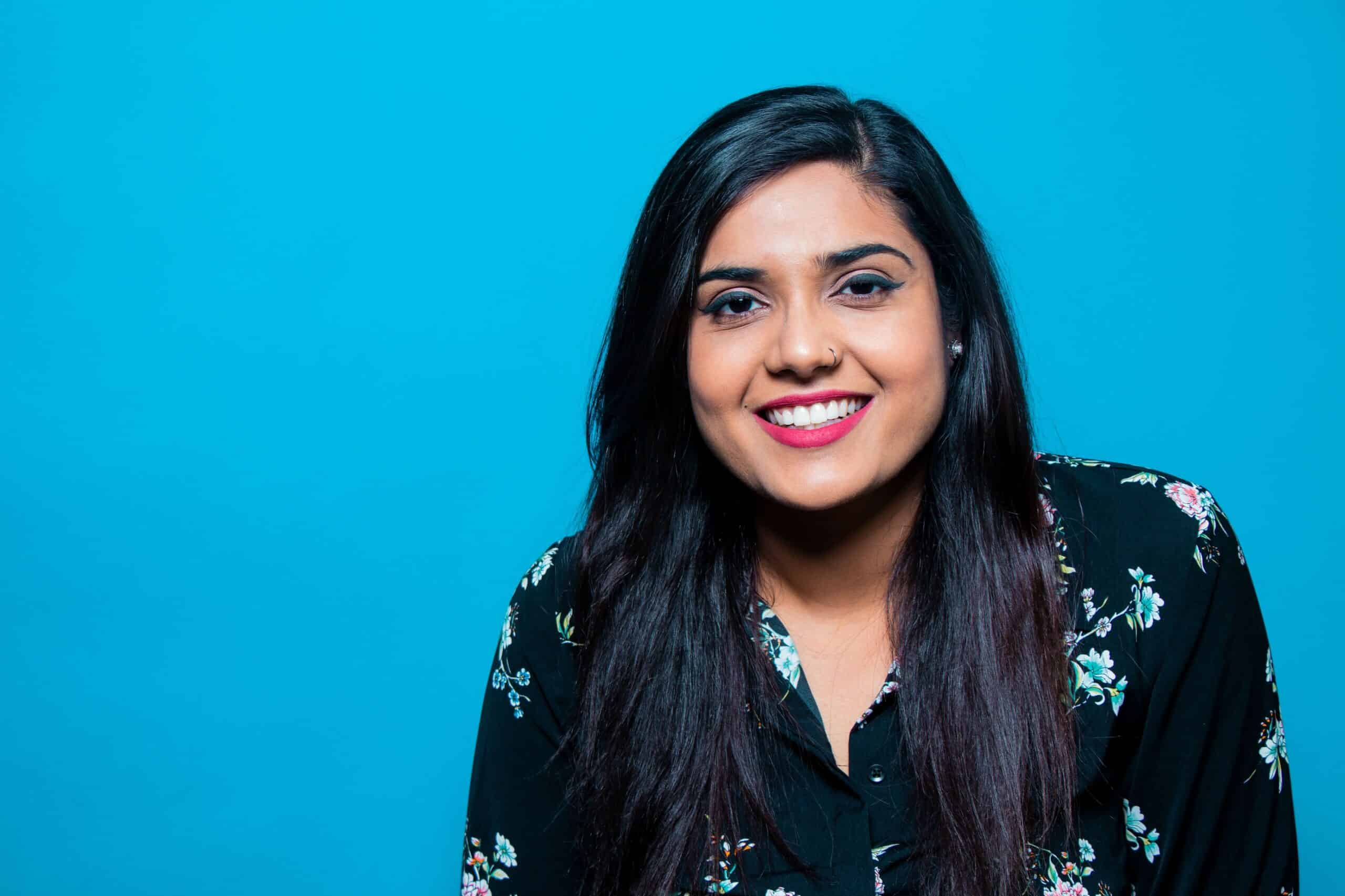Award-winning comedian, writer and theatre performer Shohana Sharmin tackles tough conversations about death with humour and frankness in her moving and important podcast Finders Grievers.
Each week, Shohana sits down with someone, often fellow comedians, to ask them about their deceased friends or family members. From the trauma they’ve experienced to how they are managing grief, no question is too personal to ask.
Dying, death, and the process of grief are all themes that have never received the attention they deserve. How many times have you refrained from reaching out to someone who has recently lost a loved one (beyond a condolence message on Facebook) because you weren’t sure what to say? We love that Shohana has created space to investigate all the complicated feelings that come with losing a loved one. We need to get to a place where there is more comfort discussing death, because to endure grief alone is unbearable.
We connected with Shohana to go deeper…
What made you want to start Finders Grievers?
I lost my mother to lung cancer in 2017. Her loss was devastating in every way, and I dove into my grief headfirst.
In 2019, I decided to create a dark sketch comedy revue called “Dead Parents Society,” exploring the seemingly unlikely connection between grief and humour. Our goal was to take some of the taboo out of grief, and realize that we are not alone (no matter how much it feels like it), and that if we look, we can even find light and laughter in the aftermath of tragedy. I was nervous about this show – I thought that putting these intensely intimate parts of ourselves onstage wouldn’t be for everyone, but the reaction from audiences and critics alike blew us away. We were critically acclaimed and won an Audience Choice Award at the Toronto Sketch Comedy Festival in March 2020. And then… the world shut down.
The pandemic brought grief to the forefront in a way I don’t think any of us could have ever imagined. Suddenly, we were witnessing countless lives lost daily, and we all entered a period of collective loss and grieving not just our loved ones, but also grieving what used to be our old normal. The isolation of the pandemic also highlighted the isolation that grieving people often feel when navigating loss in a society that doesn’t always make room for the sad parts of being human. All of these things combined made me think about grief and loss in a new way during the pandemic, and I started wondering: How do we make it okay to talk about grief, in the midst of this heaviness of collective grief we’re all going through? How do we make space for these experiences? Finders Grievers, my happy-ish podcast discussing the sad topic of grief, was born out of these questions.
What is a common thread you’ve noticed in all of your interviews?
The most common thread that comes up over and over again in my conversations about loss has been the loneliness and isolation that come hand in hand with grief. I used to think that this loneliness was mine alone because I lost my mom when I was 27, before any of my peers had lost a parent. But in every single conversation, the isolation of grief comes up regardless of age or setting. When we are sad, we retreat into ourselves because we’ve been taught since day one that being sad is not normal. Grief is like living inside a huge big ball of sadness, and it is the loneliest feeling in the world. It is devastating and isolating because you can’t explain the pain and sadness to those who have never felt it. Even your closest friends feel far away in those moments, and that is a soul-crushing feeling. The circumstances may be different, but the end result of the isolation of grief has been the same across all of these conversations.

In your opinion, when it comes to death and grief, what are the conversations we need to be having more of?
Conversations on death and grief are often treated as taboo topics. It’s this funny thing where we can talk about sad things, but not for too long and only in the “right” ways. Think about it this way: in any given social group – coworkers, friends, even family members – how many people would you feel comfortable discussing some aspect of grief or loss with? How many of your acquaintances or coworkers even know that you’ve lost someone? I mean, sure, death and loss are universal, but how often do you talk about the aftermath of these universal experiences? Grief just doesn’t “come up in conversation” the way other topics do. We minimize the experiences of grief and loss by distancing them from “polite society.” Instead, we only allow conversations around these experiences in small designated spaces – we can’t talk about grief at the dining table, but we can talk about it at the hospital, in the therapist’s office, and maybe at the bar late at night after a few drinks.
In my experience, people who have dealt with loss and grief LOVE to talk about their experiences, especially with other grievers (I mean I built an entire dark sketch comedy show and a podcast out of this because grievers basically won’t shut up about grief). This isn’t because we don’t like non-grievers. But we grievers are often implicitly or explicitly taught that it’s impolite to talk about our sadness. No one likes a bummer, right? And I don’t want to talk about my sad thing and worry that you won’t understand, or even worse, make you sad… so I just won’t talk about it at all. This is the isolation of grief – when you are experiencing what might be the worst day of your life, and you can’t even talk to your cubicle mate about it. For me, the conversations that we need to have more of are the ones where we talk about grief and loss as normal lived human experiences. To not treat these experiences as an anomaly or taboo, but instead as a valid part of being human. We need to normalize talking about death and grief, and create more spaces for these conversations to exist outside of just hospitals and therapy.
What has been your biggest discovery since launching this podcast?
I think my biggest discovery since launching Finders Grievers has been realizing how tunnel-visioned I had been about grief and loss in the past. I only understood grief in terms of my own loss – I lost my mother, and I sought out stories of others who had lost a parent. Even the title of the dark sketch comedy revue “Dead Parents Society” feels a bit strange to think about now, it’s… very niche, shall we say. I didn’t realize how many stories I was leaving behind with that title and that show. To be fair, I don’t think I’m alone in this tunnel vision. When we think about death, we think about the elderly – our parents and grandparents are the most common stories of loss we have. Since launching this podcast, I’ve spoken to folks who have lost a parent, but I’ve also spoken to those who have lost a sibling, a partner, or other loved ones. It has been eye-opening to listen to these stories.
What’s your best advice for someone who has recently lost a loved one?
If you are grieving the loss of a loved one, stop asking yourself what is or is not normal about whatever you’re feeling or doing to cope. TV shows and movies have taught us a very specific image of grief and loss, and the conventional narrative is a rather reductive one – someone dies, you feel sad and cry, you deal with it, and eventually you feel better. But what does “dealing with it” actually look like day to day? No screenwriter can answer that for you – your experiences and your ways of coping are yours and yours alone. Your stories and memories of the person you loved and lost belong only to you, and how you grieve those memories is no one’s business but your own. So stop judging yourself, and try to give yourself time and space to do and feel whatever it is you need to do or feel. If that means crying in a parking lot or on a train or in your work bathroom – cool, you do you. Or if it means going for a run or journaling or meditating or watering your plants or eating an entire cherry pie alone in bed, whatever it is – take time for yourself wherever you can. No one can do this for you, and there’s no right or wrong way to do this. It’s all normal and there is nothing wrong with you and you’re doing alright.
How has this podcast helped you?
I think Finders Grievers has helped me better understand my own (borderline) obsession with grief. It’s genuinely weird sometimes to be a 31-year-old woman who loves pop culture and wine bars and also talking about the saddest things that you’ve ever experienced – one of these things is not like the others. But my experience of navigating grief felt like this mishmash of highs and lows: the sadness of loss was always there, but there were also moments of unexpected lightness and connection and humour. And that’s what I wanted to highlight with this happy-ish podcast about sad things: that we can embrace these stories in all of their complex, messy, human glory, we can hold the good and not-so-good, we can laugh and we can cry – and it’s all allowed. Grief touches every part of our lives, and it is a lifelong journey. It is not an attempt to make light of death, but instead to honour and find humour in all parts of human mortality, the parts that we’re comfortable with and the parts that we can learn to get better at. It is not an attempt to make light of death, but instead to honour and find humour in all parts of human mortality, the parts that we’re comfortable with and the parts that we can learn to get better at. I am thankful to the wonderful folks at The Sonar Network who helped me create this space to normalize conversations about the lived human experience of grief and loss. It’s my little corner of the internet that I hope can start to lift the taboo around grief and help more grieving people feel seen and heard. And it helps me feel a little less alone in my grief too, and that’s always nice.
Death is inescapable, so let’s talk about it. Brew some tea and listen to Finders, Grievers. Follow Shohana Sharmin on Twitter and Instagram at @soleahm, and keep up to date with upcoming episodes of Finders, Grievers by following the podcast on social media at @FindersGrievers.




 Follow Us On Instagram
Follow Us On Instagram
